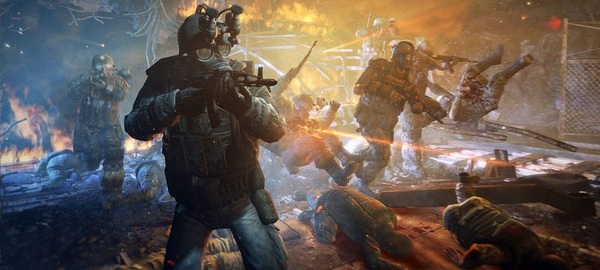Metro: Last Light is one of our most anticipated games of 2013. Truth be told, we were a little bit disappointed with its E3 trailer as it was full of scripted events, similar to the ones of Call of Duty. 4A Games is aiming for a more cinematic feel to Metro 2033’s sequel, and we have faith in this team. And even if the gameplay of Metro: Last Light won’t be up to our standards, we know for a fact that its visuals will be something to behold.
Naturally, we felt the need to ask 4A Games a couple of questions about some of the graphical features that will be supported on this new first-person shooter, and we are delighted to inform you that the game will take advantage of both multi-GPUs (SLI and CrossFire) and multi-core CPUs.
According to Oles Shishkovstov, Chief Technical Officer at 4A and the creator of the 4A Engine, Metro: Last Light will feature very good SLI scaling and as with its predecessor, the game will be scalable up to a thousand CPU cores.
A lot of our readers asked us why there hasn’t been a ‘4A Engine’ Gallery (similar to the ones of Skyrim and CryEngine 3). The reason is simple – 4A Games has not released any mod tools for Metro 2033 and as such, there haven’t been anything to show off. That might change with Metro: Last Light though, as 4A Games would love to release some mod tools for it. As you may have guessed, this isn’t a confirmation of Metro: Last Light’s modding tools, but the team is already aware of the high demand for these tools.
Moreover, 4A Games is hard at work to improve lighting as much as they can in all platforms (and as much as GPU performance allows them). Metro 2033 had a Global illumination option that could be enabled and there might be a similar option to Last Light. It will be interesting to see whether this implementation of GI will be better than Crysis 3’s. This feature was only available on the PC version – in Metro 2033 – but given Wii U’s additional raw power, we might see it hitting consoles for the first time.
Last but not least, Metro: Last Light won’t support any kind of raytracing techniques. According to Oles, raytracing is far too limited and low quality at interactive framerates. Oles has a point here but we strongly believe that raytracing is the future for PC games. Yes, there is noise filter with some implementations and it’s highly demanding. The difference in lighting quality over the ‘more-traditional’ ways, however, is simply beyond words. We also don’t know whether or not Metro: Last Light’s console development had a negative impact on the PC version (when it comes to exploiting new lighting techniques) or if 4A Games has experimented with various ray-tracing techniques this whole time.
John is the founder and Editor in Chief at DSOGaming. He is a PC gaming fan and highly supports the modding and indie communities. Before creating DSOGaming, John worked on numerous gaming websites. While he is a die-hard PC gamer, his gaming roots can be found on consoles. John loved – and still does – the 16-bit consoles, and considers SNES to be one of the best consoles. Still, the PC platform won him over consoles. That was mainly due to 3DFX and its iconic dedicated 3D accelerator graphics card, Voodoo 2. John has also written a higher degree thesis on the “The Evolution of PC graphics cards.”
Contact: Email

